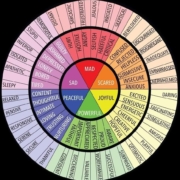I thought that today would be a good one to round up a few simple facts about feelings, so here goes. This image is a feelings wheel that can expand your emotional vocabulary. The purpose of feelings and emotions is to get you to act. However, sometimes we don’t choose the best course of action.
Posts
Word. This is the number one anxiety related sleep issue I hear about: “I wake up and can’t get back to sleep.” That is closely followed by: “I can’t get my monkey mind to stop at night when I am trying to get to sleep.” I am going to help you with both issues. It’s up to you to actually implement the help. Horses, water, drink…well you know the drill.
First we are going to get the blah, blah, blah, sleep hygiene talk out of the way. You have heard it all before, BECAUSE IT’S IMPORTANT, duh. If you can’t get these principles under wraps, you may as well stop here, even if I am going to give you some mostly secret knowledge later on.
The Speed Of Want is a chapter title I read in the recent (great) book by therapist Lori Gottlieb Maybe You Should Talk To Someone (Houghton Mifflin Harcourt, 2019). In it she alludes to what I think of as the human evolutionary trait of finding faster, easier ways to the goal, with none or less of the hard work necessary to accomplish it. Witness the recent college admissions cheating scandal. In modern times, think of the changes that have occurred simply between the start of the industrial age and the present that have impacted our lives with mass production, instant worldwide communication, and outsourced labor due to advanced robotics alone.
But there are unintended consequences to this ‘need for speed.’
As therapist, here are six things I want you to know. Some could be considered general life truisms, but they are also things that will help you progress more quickly if you choose to enter therapy.
First, why do we blush? The feeling accompanied by blushing is an exquisite sensitivity to the feeling of embarrassment. Embarrassment is often tied to shame. Blushing is an automatic, uncontrollable response to these feelings. It happens in humans because our facial veins react to this adrenaline. So when the limbic system is triggered, the blood rushes to the face causing the redness to appear. There is a lot of basic (scientific) info on this reaction here, here and here if you are interested.
But what you really want to know is how to control blushing. Right?
What better time than the start of a new year to make change that can positively affect the rest of your life? Let’s assume you have made that brave decision, and talk therapy is part of your plan. What do you expect when you are expecting talk therapy? If you want to know how I do it, read on.
People that have never experienced talk therapy often feel a tad apprehensive about getting started. There are lots of reasons. Some wonder if it will do any good at all, and others have the odd fear they won’t be able to ‘do it right.’ Some people simply don’t know how it proceeds or what is expected of them, and they are anxious about that. Still others believe they will receive all the instructions from the therapist about how to change and be on their way—with no real understanding of the courage, persistence, and work that real change takes. And some believe a pill is the answer.
Most therapists who treat anxiety disorders will teach you breath work. They also call it diaphragmatic breathing or belly breathing. But I don’t think that many teach you why this is so important in managing anxiety.
Why does the why matter? Because if you understand a little more about the positive effect this can have on your body during panic and anxiety, you are more likely to use it.
There are three solid reasons to do breath work.
It’s pretty standard knowledge that you go to therapy to change something. But changing a way of thinking or a behavior we don’t like is just not that easy, is it? And it is especially difficult to change our reactions to other’s mayhem. If it was we’d all do it and be on our merry way. Let me share three signs you need therapy.
I can’t stand feeling this way! My heart is racing. My stomach is churning. I’m sweating like a racehorse. I can’t stop! What if it never stops? Your thoughts are meanwhile trying to keep up with your racing heart at 160 beats a minute and you are well on your way to a panic attack.
This is what is happening in the more extreme moments of panic. And the first thing you must learn to do is neutralize these BIG feelings, and deflate the strength of those thoughts. It is the first step in quieting the limbic system, your central nervous system, so that you can stop a panic attack before it becomes full blown.
How to stop OCD thoughts becomes more doable when your recognize them (obsessive compulsive disorder thoughts) as just like spam. They pop instantly into your inbox with catchy titles and tantalizing “solutions.” Of course you supply those solutions, which allows a new email to pop up! Yay! Another problem to “solve” and you’re off to the races.
OCD thoughts are fearful, stubborn, repetitive, time consuming little squatters in your brain. Would you like a little help to quell them? First you have to understand them.
PAGE RUTLEDGE, LCSW, CHt | Couples Counseling
Tel: 910-777-7243
Offices at:
5006 Randall Parkway (close to UNCW)
Wilmington, NC 28403
Free parking at office









